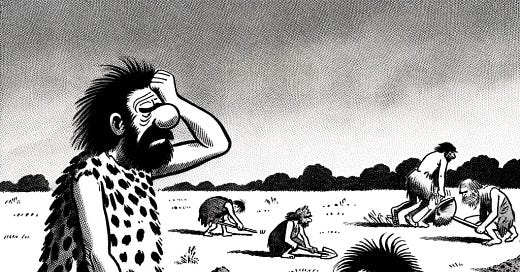Note: Usually I use this newsletter to compile original thoughts, but I’ve been thinking that it’s also a good place to summarize and disseminate interesting research. It’s a new thing, so comment or like to let me know if it’s in demand.
Did a shift in the Earth’s axis cause the transition to agriculture?
Economists like big ideas. But usually those big ideas are still parochial. A policy that affects the entire United States still only affects 330 million people. How often are economists proposing new theories about the biggest ideas, like how modern agriculture started?
A newly published paper (though not actually that new…thanks publication process) advances a new theory behind the Neolithic revolution. My favorite part about the paper is that the motivation and solution are simple economics insights. The big question about agriculture has been that skeletal remains indicate it led to less food (i.e. the bones were shorter) and it required a lot more work (i.e. the bones showed evidence of strain). This is a puzzling idea for economists. Why would the society shift to a method that had higher costs and lower benefits?
Well, even though we are always chastised for it, the economist assumes people are rational. So if the switch was made, then there must have been a benefit that we are not accounting for that rationalizes the switch. What would that be?
The author argues it was a confluence of geological events, including the shifting of the Earth’s axis, that changed the variability of seasons, making it more difficult to be a hunter/gatherer. These people would have seasons of plenty, but also seasons of famine. Agriculture, on the other hand, allowed for smoother consumption. Sure, you don’t get the plenty, but you also avoid famine. Thus, many societies around the world shifted to agriculture at about the same time.
It’s a super interesting paper and a big idea. But it’s also shows how some of the simplest ideas in economics have existed for millennia.

Did historic wars create more gendered societies?
Another Big History paper. Lots of societies throughout history have elevated the role of men and portrayed them as heroes. Even today, of the 33 Marvel Cinematic Universe movies, only 4 have female leads (Black Widow, Captain Marvel, Black Panther: Wakanda Forever, and The Marvels), and all were released after Infinity War.
Where does this gender bias come from? A new paper tries to establish a causal link between historical conflicts and modern gender roles. The mechanism is straightforward: men have a comparative advantage in physical combat, so societies that are more exposed to conflict are more likely to survive by elevating and cultivating men. This is similar to other papers that claim historical use of agricultural tools causes more gendered societies. The basic specification shows that regions within India that were more exposed to war today have greater gender divides today.
I’m usually skeptical of papers that show these “deep roots”/path dependence stories. There’s just so much that can happen in between that can confound the analysis. But there’s one aspect of it that I think gave it more credit. These regions are also less likely to have female gods in their temples and more likely to have folklore that preferences men. That cultural link might reinforce the preference for males even after combat isn’t as much of a threat.
But I’m not quite ready to go all in. The folklore is just like our superhero movies. Are those movies making our society more gendered, or do they reflect the gender norms we already had? I go with the latter. Also, if a society has a history of praising men and the glory of war, aren’t they more likely to fight? On this point, they have a strategy to claim war is exogenous to local norms, and it’s good, but I wouldn’t say it’s airtight.
It’s a fun hypothesis, and I think it’s at least worth discussing.




I really enjoyed this read. While I can't speak for others, my demand for this content is certainly there.